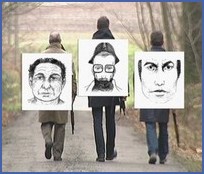|
| | Brian Crozier |  |
| | |
| Auteur | Message |
|---|
HERVE
Nombre de messages : 21558
Date d'inscription : 08/12/2009
 |  Sujet: Brian Crozier Sujet: Brian Crozier  Sam 9 Mar 2013 - 13:32 Sam 9 Mar 2013 - 13:32 | |
|  http://www.guardian.co.uk/politics/2012/aug/09/brian- crozier Richard Norton-Taylor guardian.co.uk, Thursday 9 August 2012 12.52 BST Brian Crozier obituaryIntelligence expert who formed his own organisation to counter communist propaganda The intelligence expert Brian Crozier, who has died aged 94 after a long illness, was the ultimate cold-war warrior: a political vigilante who unashamedly cultivated a close, mutually beneficial, relationship with MI6, MI5 and the CIA, successfully courted Margaret Thatcher and Ronald Reagan, and praised the dictators Pinochet and Franco. He lectured army officers about the risks of a Marxist-Leninist takeover of the ruling Labour party in the 1970s. On one occasion, after telling a group of officers about the potential need for a military coup, the audience, in his words, "rose as one man, cheering and clapping for fully five minutes". In the 1960s, at MI6's suggestion, Crozier was approached by the Congress for Cultural Freedom, a CIA-funded agency that financed publications around the world, including Encounter magazine in Britain. In 1966, with the help of CIA funds, he set up a British-based agency, Forum World Features, and later founded the Institute for the Study of Conflict. He also contributed to the Foreign and Commonwealth Office's Information Research Department (IRD), a shady organisation whose unattributable reports distributed to susceptible journalists and MPs were designed to highlight the dangers of communist subversion. The IRD was disbanded by David Owen soon after he was appointed foreign secretary in 1977. That year, continuing in his role of what British intelligence agencies call "an alongsider", Crozier set up a new group, "The 61". Its aim was to make up for what he perceived as the failure of western governments to counter communist Soviet propaganda effectively. A former senior MI6 officer, Nicholas Elliott, was one of its fundraisers. Among Crozier's friends was Charles Elwell, MI5's head of counter-subversion until 1981, who instructed his officers to monitor the activities of trade union leaders, as well as the National Council for Civil Liberties and the Campaign for Nuclear Disarmament. So, too, was Stephen Hastings, a Tory MP with whose help he set up the Shield Committee, designed to combat subversion, a phenomenon Crozier described as the "political equivalent of Aids". He presented a further proposal for a "Counter-Subversion Agency" at a meeting in the City in the summer of 1978, chaired by Thatcher and attended by Sir Keith Joseph, Willie Whitelaw, Lord Carrington and Harry Sporborg of Hambros bank (who had been deputy head of the wartime Special Operations Executive). Thatcher suggested the new agency should be attached to No 10, but Carrington vetoed the plan. Crozier was born in the small mining village of Kuridala, Queensland, Australia, where his father was a mining engineer. He came to Britain at the age of five, but the family moved to France in 1923. They returned to Britain in 1930 and he studied at Trinity College of Music in London. He was a talented young composer and pianist, and music engaged him throughout his life. He was still playing his own compositions and those of Scriabin, Chopin, Fauré and Schumann on his Bechstein grand piano a week before he died. It was while at Trinity College that he started his career as a journalist and author. He worked for the Stoke-on-Trent Evening Sentinel and the Stockport Express before joining Reuters news agency in 1943. A year later, he joined the News Chronicle as a subeditor. In 1948, he was offered a three-year contract on the Sydney Morning Herald. He subsequently rejoined Reuters through its Australian counterpart, Australian Associated Press, which sent him to Indonesia, Singapore and Saigon, where he covered the war leading to the defeat of the colonial power, France, in Indochina. Crozier returned to Britain in 1953, to run Foreign Report, a confidential bulletin of The Economist magazine, and broadcast general commentaries twice a week on the BBC overseas service in French and Spanish, before extending his intelligence sources and branching out on his own. His books include Neo-colonialism (1964), South East Asia in Turmoil (1965), A Theory of Conflict (1974), The Rise and Fall of the Soviet Empire (1999) and biographies of Franco (1967), De Gaulle (1973) and Chiang Kai-Shek (1976). In 1993, he wrote Free Agent: The Unseen War 1941-1991, in which, much to the chagrin of MI5 and MI6, he described in detail his links with western intelligence agencies. He is survived by his second wife, Jacqueline, his daughters, Kathryn-Anne, Isobel and Caroline, and son, Michael. • Brian Rossiter Crozier, journalist and intelligence expert, born 4 August 1918; died 4 August 2012 |
|   | | HERVE
Nombre de messages : 21558
Date d'inscription : 08/12/2009
 |  Sujet: Re: Brian Crozier Sujet: Re: Brian Crozier  Sam 9 Mar 2013 - 15:17 Sam 9 Mar 2013 - 15:17 | |
|
Voir aussi :
http://www.powerbase.info/index.php/Brian_Crozier
Brian Rossiter Crozier (b. 4 August 1918 - d. 4 August 2012) was an historian, strategist, and journalist. He founded the Institute for the Study of Conflict, a right-wing propaganda group, reported to have been set up by the CIA and British intelligence in 1970. He is a veteran of the cold war and has provided advice to the British Secret Intelligence Service, the Information Research Department, and the CIA. He wrote for Reuters and The Economist, was an editor for The Sunday Times and a commentator for the BBC. He wrote a column for National Review. Crozier was a Distinguished Visiting Fellow on War, Revolution, and Peace of Stanford University's Hoover Institution. He died on his birthday in 2012 at the age of 94.[2]
(...)
Sur la Hoover Institution :
http://www.powerbase.info/index.php/Hoover_Institution
Il serait très intéressant d'avoir accès aux archives de la Hoover Institution, notamment :
http://www.oac.cdlib.org/findaid/ark:/13030/kt6g5013m5/
http://www.oac.cdlib.org/view?docId=kt6g5013m5;style=oac4;view=dsc
Par exemple :
Box/Folder 8 : 2-3
Ordre des Chevaliers du Rouvre, 1973.
Scope and Content Note
Includes correspondence with Giorgio G. Gherardi Dandolo
Box/Folder 142 : 1-3
Vankerkhoven, Paul
Box/Folder 42 : 8
Vankerkhoven, Paul (European Parliament), undated
mais il semble très difficile de pouvoir en disposer !
Si j'ai bien compris la procédure pour des demandes "importantes", il faut passer par un assistant de recherche sur place, qui doit être rétribué (outre le prix des copies). La liste des assistants peut être envoyée par M. Siekierski.
Nicholas Siekierski
Assistant Archivist for Exhibits and Outreach
Hoover Institution
Stanford University
Stanford, CA 94305-6010
650-723-2065 (office)
nsiekierski@stanford.edu
A partir d'un certain moment, je n'ai tout simplement plus eu de réponses ...
|
|   | | HERVE
Nombre de messages : 21558
Date d'inscription : 08/12/2009
 |  Sujet: Re: Brian Crozier Sujet: Re: Brian Crozier  Sam 9 Mar 2013 - 18:54 Sam 9 Mar 2013 - 18:54 | |
| Sur Brian Crozier, il faut voir notamment les articles suivants : https://wikispooks.com/wiki/Brian_Crozier https://wikispooks.com/wiki/Institute_for_the_Study_of_Conflict http://www.powerbase.info/index.php/Brian_Crozier Voir également "Dirty Work: the CIA in Western Europe" Philip Agee, 1978 Il y a un chapitre consacré à Crozier (p. 204-210) http://fr.scribd.com/doc/76584907/Dirty-Work-CIA-in-Europe-Philip-Agee-1978#page=106    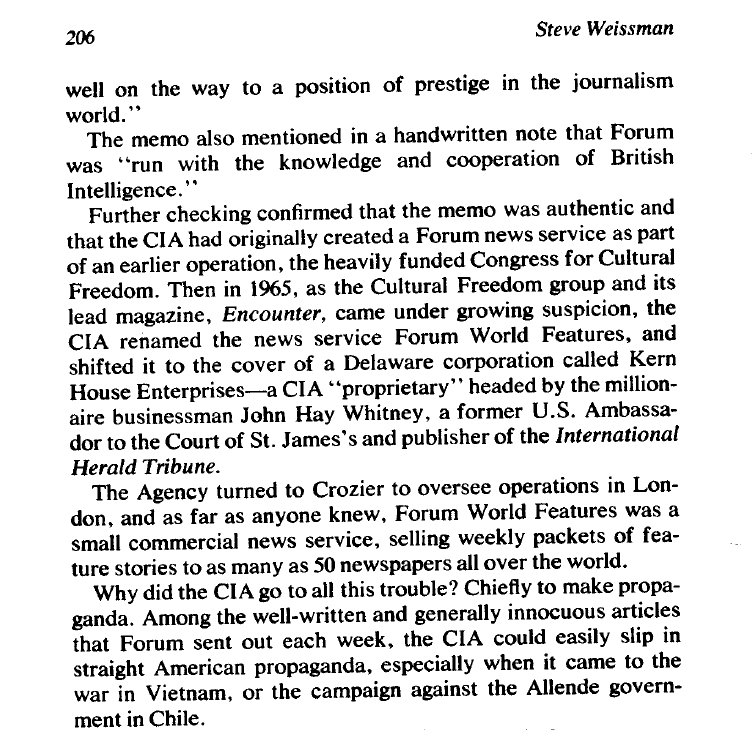   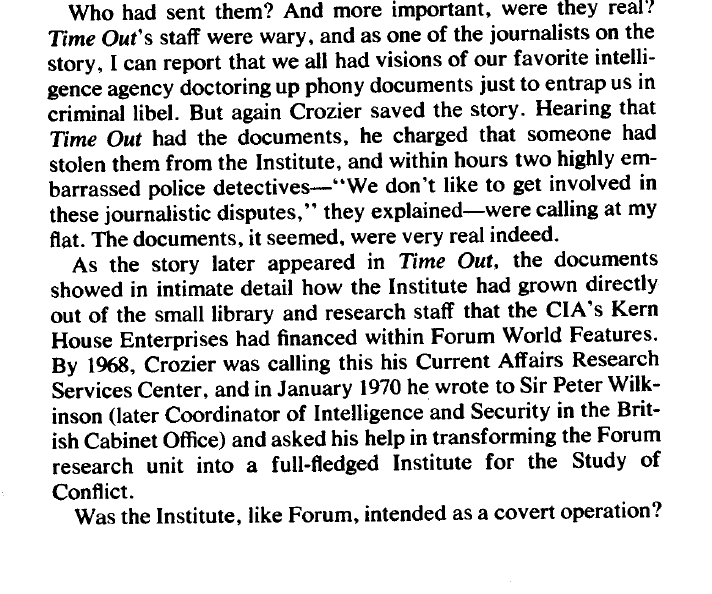      |
|   | | HERVE
Nombre de messages : 21558
Date d'inscription : 08/12/2009
 |  Sujet: Re: Brian Crozier Sujet: Re: Brian Crozier  Sam 9 Mar 2013 - 18:59 Sam 9 Mar 2013 - 18:59 | |
|
Si l'on veut en savoir plus sur Brian Crozier et l'ISC, il faut aussi s'intéresser à son associé Robert Moss (autre "journaliste" ou plutôt désinformateur; impliqué dans les opérations de déstabilisation de la CIA contre Allende et lié aux partisans de Pinochet dans les media chiliens; par la suite, il a écrit les discours électoraux de Margaret Thatcher).
Moss était lui-même lié à Arnaud de Borchgrave (autre "journaliste" lié à la CIA, comptant parmi ses associés le régime rhodésien, le Shah d'Iran, mais également la secte Moon / journal Washington Times, et plus tard la fondation Heritage).
Il y a beaucoup de choses dans CAIB/CAQ et dans Counterspy à leur sujet.
Voir :
https://wikispooks.com/wiki/Robert_Moss
http://www.sourcewatch.org/index.php/Arnaud_de_Borchgrave
|
|   | | HERVE
Nombre de messages : 21558
Date d'inscription : 08/12/2009
 |  Sujet: Re: Brian Crozier Sujet: Re: Brian Crozier  Sam 9 Mar 2013 - 19:03 Sam 9 Mar 2013 - 19:03 | |
|
Brian Crozier aurait participé aux campagnes de propagande attribuant à l'URSS la responsabilité intégrale du "terrorisme international".
Dans ces opérations de propagande, le gouvernement israélien (Jonathan Institute) jouait un rôle majeur (voir aussi le rôle des auteurs comme Claire Sterling, active ensuite dans la promotion de la "filière bulgare")
Voir
https://wikispooks.com/wiki/The_Experts_extract_from_The_%22Terrorism%22_Industry
The "Terrorism" Industry
Ed Herman and Gerry O'Sullivan, 1989
http://www.powerbase.info/index.php/Jerusalem_Conference_on_International_Terrorism
http://www.powerbase.info/index.php/Jonathan_Institute
|
|   | | HERVE
Nombre de messages : 21558
Date d'inscription : 08/12/2009
 |  Sujet: Re: Brian Crozier Sujet: Re: Brian Crozier  Sam 9 Mar 2013 - 19:33 Sam 9 Mar 2013 - 19:33 | |
|
dans " Lobster ", voir
http://www.lobster-magazine.co.uk/Crozier.html
|
|   | | HERVE
Nombre de messages : 21558
Date d'inscription : 08/12/2009
 |  Sujet: Re: Brian Crozier Sujet: Re: Brian Crozier  Sam 9 Mar 2013 - 19:49 Sam 9 Mar 2013 - 19:49 | |
|
Aussi
https://wikispooks.com/ISGP/organisations/Le_Cercle.htm#crozier
|
|   | | UncleHo
Nombre de messages : 56
Date d'inscription : 17/11/2011
 |  Sujet: Re: Brian Crozier Sujet: Re: Brian Crozier  Sam 9 Mar 2013 - 21:43 Sam 9 Mar 2013 - 21:43 | |
| - HERVE a écrit:
dans " Lobster ", voir
http://www.lobster-magazine.co.uk/Crozier.html
Les numéros 1 à 31 de la revue Lobster sont librement téléchargeables sur le site suivant: http://www.8bitmode.com/rogerdog/lobster/Deux remarques cependant: - A posteriori, une partie des rédacteurs a admis que les numéros 1 à 8 contiendraient des informations erronées sur certains sujets http://www.lobster-magazine.co.uk/issue01.php- La revue a commencé à paraître en 1983; mais en 1993 ses fondateurs , Robin Ramsay et Stephen Dorril , se sont séparés (en très mauvais termes), et chacun a continué à publier sa version du journal. Le site dont parle Hervé est animé par Robin Ramsay; tandis que celui que je mentionne dépend de Stephen Dorril. Voir: http://en.wikipedia.org/wiki/Lobster_%28magazine%29 |
|   | | HERVE
Nombre de messages : 21558
Date d'inscription : 08/12/2009
 |  Sujet: Re: Brian Crozier Sujet: Re: Brian Crozier  Sam 9 Mar 2013 - 23:51 Sam 9 Mar 2013 - 23:51 | |
| Merci pour toutes ces précisions, que j'ignorais en partie ! Sur l'ISC (en 1974) et Brian Crozier  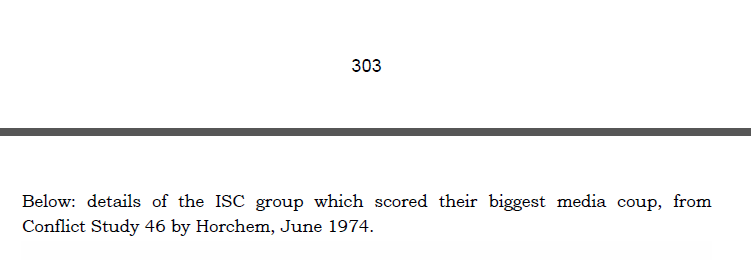  Extraits du livre de David Teacher ( " Rogue Agents " ) https://wikispooks.com/wiki/File:Rogue_Agents_(3rd_edition,_2011,_full).pdf (full version 37Mb) |
|   | | HERVE
Nombre de messages : 21558
Date d'inscription : 08/12/2009
 |  Sujet: Re: Brian Crozier Sujet: Re: Brian Crozier  Dim 10 Mar 2013 - 0:19 Dim 10 Mar 2013 - 0:19 | |
| http://www.telegraph.co.uk/news/obituaries/politics-obituaries/9462513/Brian- Crozier.html  5:52PM BST 08 Aug 2012 A cold warrior of hard-line convictions, he recognised earlier than most the odious nature of the Soviet regime, and exposed the crimes of Lenin and Stalin long before the release of Soviet archives convinced other historians that he was right. From the 1950s onwards Crozier set about exposing the true character of Left-wing dictatorships and challenged the illusions of their Western apologists . By arguing that the West must stand up to communism , he helped provide the intellectual underpinning for the robust defence strategy championed by President Reagan and Margaret Thatcher. But Crozier never got the credit he considered he deserved, mainly because, as his career progressed, he appeared to become increasingly cranky , exaggerating both the effectiveness of Soviet subversion in the West and the importance of his own campaign against it. While he succeeded in gaining an audience at the highest levels (in 1988 he entered The Guinness Book of Records as the writer who had interviewed the most heads of state and government ), it was seldom long before Crozier’s fellow cold warriors found it prudent to keep a polite distance. As a result, his career was marked by a series of rebuffs which he, naturally, blamed on the KGB or the CIA, or possibly the British Foreign Office. Crozier summarised his views in Strategy for Survival (1978), in which he argued that, far from promoting peace, the West’s policy of détente was undermining its own stability and claimed that ever since the Second World War another war had been in progress — a “unilateral war of aggression, expansion and attrition waged solely on the Soviet and communist side”. This “Third World War” had been abetted by Western politicians who failed to understand that expansion was the raison d’être of Soviet communism. Crozier concluded that détente that did not extend to ideology was meaningless. He suggested that the West should respond with a massive educational campaign to counteract communist propaganda, and the cessation of export credits to prevent the Soviet Union benefiting from economic ties with the West. His obsession with communist infiltration dated back to the 1950s, when, as a Reuters correspondent in South East Asia, he began to compile a card index of the world’s extremist organisations. In 1971 he decided to set up a new institute to study revolutionary violence more systematically. The Institute for the Study of Conflict collated information on extremist movements across the world, attracting attention and sometimes notoriety by, for example, publishing a report on Left-wing infiltration into higher education. But its briefings were studied carefully by Western opinion formers . Crozier’s work brought him to the attention of Mrs Thatcher, whom he first met in 1976 when she was Leader of the Opposition. She was impressed by his account of Soviet penetration of the trade unions and the Labour Party, and agreed that he should set up a secret advisory committee to brief her on subversion. But although, initially, Mrs Thatcher seemed receptive , her colleague on the committee, Lord Carrington, was “systematically hostile”. In 1978 Carrington vetoed Crozier’s proposal that an incoming Conservative government should establish a new “Counter Subversion Executive” to oppose anti-British subversive activity around the world by “all clandestine means”. Crozier dreamed of becoming a close adviser to Mrs Thatcher after the election and conceived his role as running far wider than advising on security: “I considered it one of my own prime tasks to strengthen her self-confidence and to suggest ways in which to cultivate and consolidate a public image of clearheadedness and resolution.” After the 1979 election, however, things did not go according to plan. Crozier was upset not to have been given a peerage and wrote to the new Prime Minister to ask what had happened, but received a reply which “did not clarify the issue”. At a lunch to which he was invited at Chequers , Mrs Thatcher told him he could call her Margaret, but the message, “unspoken but clear”, was “thanks but no thanks”. It was not the first time that Crozier had found himself rebuffed by people he had considered ideological allies. He himself had appointed the mainly Right-wing former diplomats, academics and soldiers who made up the board of the Institute for the Study of Conflict, but even they found themselves embarrassed by Crozier’s more eccentric views. Of one paper he championed, the historian Max Beloff, hardly a pillar of liberalism, had exploded: “We can’t possibly be associated with extreme views like this!” They also found it hard to rebut allegations that Crozier was a frontman for the CIA, a charge he denied, but which drew strength from his enthusiasm for Right-wing dictatorships as well as his former incarnation as the head of the CIA-funded news agency Forum World Features. One day in 1979, Crozier turned up at his office to find the locks had been changed and picked up a note informing him he was no longer director. A man who had spent his life studying conspiracy had become the victim of one. The son of a mining engineer, Brian Rossiter Crozier was born in Queensland, Australia, on August 4 1918 and educated in Europe at the Lycée in Montpellier, then at Peterborough College in Harrow, and Trinity College of Music, London. He began as a music and art critic, then became a reporter on local newspapers. After wartime service in aeronautical inspection, from 1944 to 1948 he worked on the News Chronicle. In 1948 he returned to Australia to work on the Sydney Morning Herald, and in 1951 became a Reuters correspondent in the Far East. Subsequently he worked for The Straits Times in Singapore, and, from 1954 to 1964, as a leader writer and editor of the Economist Foreign Report and as a correspondent for the BBC’s overseas services. From 1965 to 1974 he was chairman of the Forum World Features news agency. Rebels (1960) was the first of a series of studies of insurrectionary movements in the developing world. He expanded the themes of nationalism and communist insurgency in The Morning After (1963), Neo-colonialism (1964), South East Asia in Turmoil (1965) and The Struggle for the Third World (1966). In The Masters of Power (1969) he analysed the exercise of power in the modern world. In 1973, as director of the Institute for Conflict Studies, Crozier oversaw the publication of the Annual of Power Conflict 1972-73, a worldwide survey of political violence. The next year, in A Theory of Conflict, he argued that the state is a necessity but rebellion against it inevitable. Yet Crozier differentiated between totalitarianism and authoritarianism and found much to praise in totalitarian regimes which permitted economic freedom. His biography Franco (1967) was an unashamedly partisan account, and Crozier would later argue that Franco’s Spain had been a remarkably free country — better governed than the democratic Spain which followed. While acknowledging that the Indonesian dictator General Suharto had massacred half a million people , Crozier praised him as “a man of cool nerve, caution, and natural political skill”, though he was less charitable to Chiang Kai-shek, whose biography, The Man who Lost China, he published in 1977. Such was Crozier’s admiration for Right-wing military leaders that in his memoirs, published in 1993, he admitted to having flirted during the 1970s with the idea of a military intervention if Britain were taken over by Left-wing extremists. In The Minimum State (1979) he advocated the replacement of the British political system based on parties with a professional cadre composed of graduates in political and social sciences, economists, professional journalists of at least five years experience and ex-officers of the armed forces. These people would stand at elections, two to each constituency, with the winners forming the government side and the losers the opposition. In reviewing the book, Enoch Powell said that he had “considered very anxiously whether The Minimum State is not a solemn leg pull devised to trap the imprudent reviewer who took it seriously. Sadly I have concluded otherwise.” In 1977 Crozier and some colleagues had set up their own intelligence service, the “61” (6th International) to wage war against Soviet subversion. The organisation succeeded, so Crozier claimed, in infiltrating the Militant Tendency and CND, but otherwise its activities verged on the ineffectual. Among many other books, Crozier wrote The Rise and Fall of the Soviet Empire (1999), and a somewhat hostile two-volume biography of General de Gaulle. In Free Agent: the unseen war 1941-1991 (1993), billed as the “memoir Number 10 tried to stop”, Crozier portrayed himself as a lone fighter against the forces of communist darkness. His last book was Political Victory: The Elusive Prize of Military Wars (2005). Brian Crozier married, in 1940, Mary Samuel, who died in 1993. He is survived by his second wife, Jacqueline, whom he married in 1999, and a son and three daughters of his first marriage. Brian Crozier, born August 4 1918, died August 4 2012 _ _ _ Crozier was a Distinguished Visiting Fellow on War, Revolution, and Peace of the Hoover Institution http://www.hoover.org/library-and-archives  http://www.oac.cdlib.org/findaid/ark:/13030/kt6g5013m5/entire_text/?query=Belgium Voir https://wikispooks.com/wiki/Hoover_Institution_on_War,_Revolution_and_Peace http://www.sourcewatch.org/index.php?title=Hoover_Institution Parmi les mécènes, la Sarah Scaife Foundation (merci à " A ") http://www.sourcewatch.org/index.php/Scaife_Foundations http://www.rightweb.irc-online.org/profile/Scaife_Foundations The Scaife Foundations’ support for groups like the American Enterprise Institute, Heritage Foundation, and Hoover Institution have been instrumental in pushing right-wing domestic and foreign policy agendas, from the anti-communism of the 1970s to the neoconservative ideas that influenced the George W. Bush administration’s “war on terror.” |
|   | | HERVE
Nombre de messages : 21558
Date d'inscription : 08/12/2009
 |  Sujet: Re: Brian Crozier Sujet: Re: Brian Crozier  Dim 10 Mar 2013 - 0:27 Dim 10 Mar 2013 - 0:27 | |
|
http://www.scribd.com/doc/86199372/De-Bonvoisin-et-Cie-2
(...) Jean Violet a commencé sa carrière au service "action" du SDECE, les services secrets français. Devenu agent d'influence à l'échelle internationale, il a été viré en 1970 par le nouveau responsable du SDECE, Alexandre de Marenches. Celui-ci le considérait comme un "escroc du renseignement". Les cercles financés par Violet sont fréquentés par de gens appartenant au monde du renseignement comme Brian Crozier, Jean Bougerol (un de ses correspondants en Belgique) ou le comte Hans Huyn, un ancien des services spéciaux allemands devenu responsable de la section "renseignements-action" de la CDU-CSU, frère teuton du PSC. Les mécanismes que l'on retrouve autour du baron de Bonvoisin en matière de renseignements ne sont donc pas proprement belges. (...)
Voir :
http://de.wikipedia.org/wiki/Hans_Graf_Huyn
(...) Han Huyn war auch Familiar des Deutschen Ordens (...)
http://de.wikipedia.org/wiki/Deutscher_Orden
Der vollständige Name lautet Orden der Brüder vom Deutschen Haus Sankt Mariens in Jerusalem, lateinisch Ordo fratrum domus Sanctae Mariae Teutonicorum Ierosolimitanorum. Aus der lateinischen Kurzbezeichnung Ordo Teutonicus leitet sich das Ordenskürzel OT ab.
_ _
Il est question de l'Ordre Teutonique ailleurs dans les dossiers :
http://www.bendevannijvel.com/forum/viewtopic.php?id=1070
(...) Maar Mercier is een ander verhaal (hoewel de twee elkaar niet uitsluiten). Hij zou het Belgische aanspreekpunt ('Landers Vertreten Inspector') geweest zijn van een internationale organisatie (Polizei Algemeine Lichtung, PAL) met hoofdkwartier in Keulen. In september 1983 zou WNP wapens uit Keulen hebben ontvangen en Libert heeft het gehad over WNP-kaarten die gemaakt werden in Keulen. Mercier zelf had het over een telg van Habsbourg-Lorraine in Keulen (Otto von Habsburg) die kanselier was van een 'Ordre Teutonique' (waarschijnlijk 'Deutschritterorden' = Duitse Orde), dewelke haar hoofdzetel in Wenen zou hebben gehad en waarvan WNP een soort Belgische 'commanderie' zou zijn geweest.
Barbier vertelde aan Haquin dat hij zijn codenaam 'von Salza' ook gebruikte in de orde van de 'chevaliers teutonique' in Keulen, waarvan hij lid was (s: les taupes de l'extreme droite). Libert vertelde aan Haquin dat deze orde bestond uit ex-leden van de SS-universiteit van Bad Tülz. De internationale organisatie zou een link hebben gehad met de Spaanse falangisten (via Mujo). In een WNP-postbus (n°321, Centre Monnaie) werden brieven uit Spanje ontvangen die aan Nicole Schollaerts werden overgemaakt (dixit Nemry). Van een bevriende Spaanse dienst vernam men binnen de Staatsveiligheid dat er contacten waren tussen Latinus en buitenlandse militairen. Er kan vermoed worden dat PAL en de 'Ordre Teutonique' in verband stonden met de AESP, gecentreerd rond Otto von Habsburg, waar het Spanje van Frankrijk goed vertegenwoordigd was (bv Sanchez-Bella) waartoe ook Paul Vanden Boeynants, Benoit de Bonvoisin en Bernard Mercier behoorden, allemaal figuren uit de sfeer van WNP. (...)
A noter que Libert a déclaré qu'il a travaillé pour le PAL (Polizei Algemeine Lichtung).
|
|   | | HERVE
Nombre de messages : 21558
Date d'inscription : 08/12/2009
 |  Sujet: Re: Brian Crozier Sujet: Re: Brian Crozier  Dim 10 Mar 2013 - 0:37 Dim 10 Mar 2013 - 0:37 | |
|
http://www.voltairenet.org/article12838.html
(...) L’archiduc Otto de Habsbourg, prétendant à la couronne impériale d’Autriche-Hongrie, s’est imposé comme leader du monarchisme catholique en Europe. Il a créé à l’abri de l’Espagne franquiste le centre européen de documentation internationale (CEDI), qui organise chaque année un séminaire à l’Escorial pour les dirigeants opusiens du continent [7]. Il a également créé une Académie européenne de sciences politiques qui lui permet d’étendre son influence dans la droite non-catholique. Et a pris le contrôle du Mouvement européen de Richard de Koudenhove-Kalergi. En un mot, il exerce un magistère incontesté sur toutes les organisations européennes atlantistes.
Un groupe d’action inter-services
Les trois hommes invitent le gotha des services secrets et des politiciens anti-communistes à se joindre à eux lors de deux réunions annuelles et financent toutes sortes d’instituts et de revues. En quelques années le Cercle se trouve en capacité de lancer « des opérations de contre-subversion » au sein des pays européens « contaminés par l’idéologie communiste ».
Parmi les participants réguliers du Cercle, on relève Giulio Andreotti (éternel ministre italien), le général Antonio de Spinola (chef des putschistes portugais), le colonel Botta (directeur des services suisses), William Colby (directeur de la CIA de 1973 à 1976), Stefano della Chiaie (chef d’un service secret italien), Nicholas Elliott (directeur du SIS/MI6 britannique), Alexandre de Marenche (chef du SDECE français de 1971 à 1981) [8], Alfredo Sanchez Bella (directeur des services espagnols), le général D. Stilwell (commandant de la DIA) et Franz Josef Strauss (ministre allemand de la Défense).
Le Cercle finance l’Institut pour l’étude des conflits (Institute for the Study of Conflicts - ISC) à Londres dirigé par Brian Crozier, par ailleurs patron de l’agence de presse du Congrès pour la liberté de la culture [9], Forum World Features [10]. Crozier est épaulé par le journaliste Robert Moss. L’institut édite une revue, Le Monde des conflits, dont la réalisation technique est assurée par Georges Albertini, un ancien Collaborateur devenu l’un des principaux agents de la CIA en France [11]
Une revue, Le Monde moderne, diffuse la pensée du Cercle. Elle est financée par les fonds secrets du BOSS, le service secret d’Afrique du Sud. Antoine Pinay prend à cette occasion la présidence du lobby de l’apartheid en France, l’Association des amitiés françaises des communautés sud-africaines (AFCA).
À titre d’exemple de fonctionnement de ce système, en 1972, le Cercle commande un rapport à l’Institut pour l’étude des conflits sur « la sécurité européenne et le problème soviétique ». Brian Crozier y dresse une description apocalyptique du péril rouge sur le point d’envahir l’Europe et de détruire sa civilisation. Maître Jean Violet se rend à la Maison-Blanche pour en remettre une copie au président Richard Nixon et au conseiller national de sécurité Henry Kissinger, ainsi qu’à l’Élysée pour le président Georges Pompidou. Le document est intégralement publié dans Le Monde moderne, il est diffusé par l’Académie européenne des sciences politiques et par le Congrès pour la liberté de la culture à leurs membres. Il se répand dans la presse par le biais de l’agence Forum World Features.
Le Cercle a également été mis en cause dans des opérations de déstabilisation du chancelier allemand Willy Brandt au profit de Franz Joseph Strauss [12], et contre le chancelier autrichien Bruno Kreisky et le Premier ministre suédois Olof Palme. Il a aussi joué un rôle dans la campagne de presse ayant favorisé l’ascension de Margaret Thatcher. (...)
|
|   | | HERVE
Nombre de messages : 21558
Date d'inscription : 08/12/2009
 |  Sujet: Re: Brian Crozier Sujet: Re: Brian Crozier  Dim 10 Mar 2013 - 1:01 Dim 10 Mar 2013 - 1:01 | |
|
http://www.independent.co.uk/news/obituaries/brian-crozier-intelligence-and-security-expert-who-fought-communism-and-founded-his-own-spy-network-8036652.html
Brian Crozier: Intelligence and security expert who fought communism and founded his own spy network
Chris Bellamy
(...) Among the achievements of an extraordinary 94-year life, Crozier had the rare distinction of having founded his own private enterprise spy network, "The 61", in 1977.
The 61 worked with established intelligence agencies, including MI5, MI6 and the CIA – but, Crozier alleged, independently of them. (...)
During the 1950s and '60s, Crozier worked for The Economist and for the Information Research Department, a covert anti-communist propaganda unit within the Foreign Office.
He also started to work with the CIA, MI6 and the intelligence agencies of France, Germany, the Netherlands, Belgium, Morocco, Iran, Argentina, Chile, and Taiwan. During this period he published his first books: The Rebels: A Study of Post-War Insurrections (1960); Neo-colonialism (1964) and South-East Asia in Turmoil (1965). The latter became the definitive text for senior American soldiers and diplomats sucked into the maelstrom of the Vietnam War.
In 1968 Crozier was a founder-member of the Institute for the Study of Conflict, working with the leading Sovietologist, Professor Leonard Schapiro of the LSE. It was the first private think-tank devoted to the study of terrorism and subversion, and published an important series of monographs called Conflict Studies. In 1973 Crozier became its Director, but was ejected in 1979 after a coup which may have been driven by MI6 and/or the CIA. However, the immediate cause was another of Crozier's initiatives.
After the Information Research Department, which had been waging an information campaign to warn of Soviet espionage and infiltration, was closed down in 1977, Crozier had been instrumental in setting up "a private-sector operational intelligence agency". Echoes of Crozier's vision are re-emerging, as private security companies increasingly take on functions formerly considered to be the preserve of government. Initially the private intelligence agency had no name; it should not have been "sixty-one" but "6 I", for the "Sixth International".
(...)
_ _ _
Le monde est petit ...
Dans
https://deeppoliticsforum.com/forums/showthread.php?1521-Brian-Crozier
on apprend que l' ISC de Brian Crozier a été financé par Richard Mellon Scaife ... la fortune de Mellon venant de Gulf Oil ...
(...) Soon thereafter, through his CIA contacts, he met with the now quite controversial Richard Mellon Scaife, who granted $100,000 a year to Crozier's ISC. Scaife was part heir to the Mellon fortune, a major shareholder in Gulf Oil, and the person who took over Crozier's FWF in the early 1970s. When the ISC took off, Crozier developed a closer relationship with the CIA and met with its representatives about 4 times a year in Langley. (...)
|
|   | | HERVE
Nombre de messages : 21558
Date d'inscription : 08/12/2009
 |  Sujet: Re: Brian Crozier Sujet: Re: Brian Crozier  Dim 10 Mar 2013 - 8:35 Dim 10 Mar 2013 - 8:35 | |
|
Sur Richard Mellon Scaife, voir
http://en.wikipedia.org/wiki/Richard_Mellon_Scaife
(...)
When Scaife refocused his political giving away from individuals and toward anti-communist research groups, legal defense funds, and publications, the first among these was the Hoover Institution on War, Revolution, and Peace at Stanford University.
Through contacts made at Hoover and elsewhere, Scaife became a major, early supporter of the Heritage Foundation, which has since become one of Washington's most influential public policy research institutes. He currently serves as vice-chairman of the Heritage Foundation board of trustees.[22]
http://www.heritage.org/about/board-of-trustees
_ _ _
Voir aussi :
http://www.aei.org/scholar/michael-rubin/
|
|   | | HERVE
Nombre de messages : 21558
Date d'inscription : 08/12/2009
 |  Sujet: Re: Brian Crozier Sujet: Re: Brian Crozier  Dim 10 Mar 2013 - 11:18 Dim 10 Mar 2013 - 11:18 | |
| ISC / Cercle :   ISC - comité des USA : 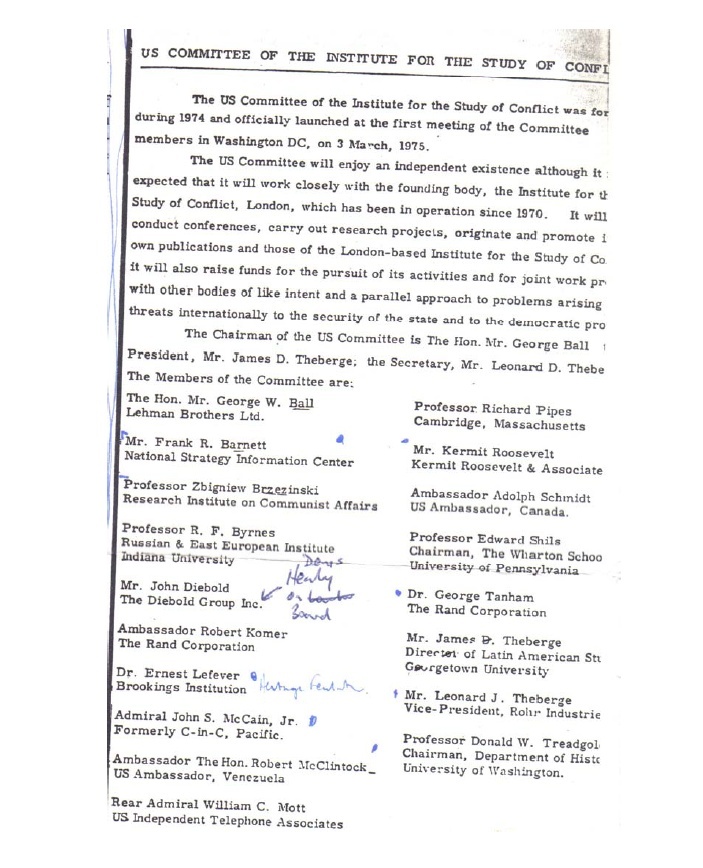 Intéressant à approfondir : John Diebold John Diebold est un pionnier de l'utilisation généralisée des ordinateurs, ainsi que des applications automatisées dans les entreprises. Sauf erreur de ma part, c'est un fournisseur de machines à voter informatisées ... http://fr.wikipedia.org/wiki/Diebold |
|   | | HERVE
Nombre de messages : 21558
Date d'inscription : 08/12/2009
 |  Sujet: Re: Brian Crozier Sujet: Re: Brian Crozier  Dim 10 Mar 2013 - 11:47 Dim 10 Mar 2013 - 11:47 | |
| https://wikispooks.com/ISGP/miscellaneous/First_ever_documents_of_Le_Cercle.htm http://fr.scribd.com/doc/129276221/1982-06-11-13- Crozier-Cercle-Speech-Germany 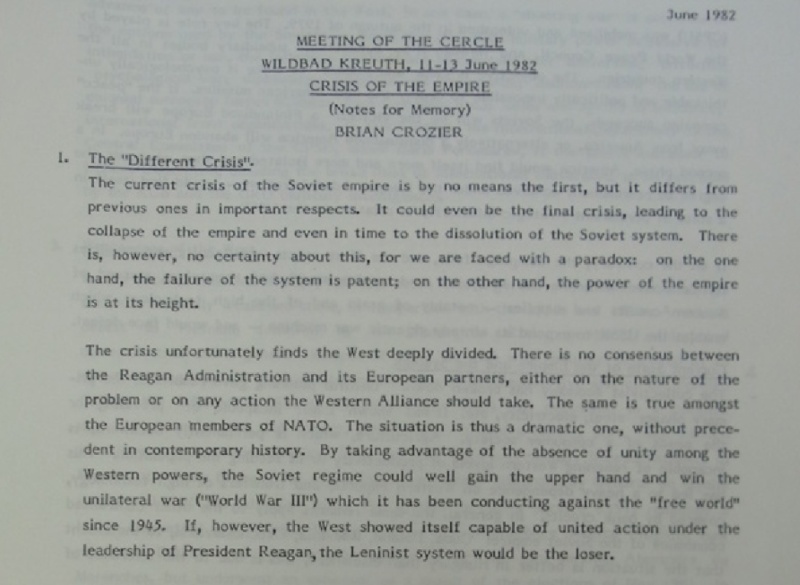  |
|   | | HERVE
Nombre de messages : 21558
Date d'inscription : 08/12/2009
 |  Sujet: Re: Brian Crozier Sujet: Re: Brian Crozier  Dim 10 Mar 2013 - 14:16 Dim 10 Mar 2013 - 14:16 | |
| Autre participation de Brian Crozier : le CEDI 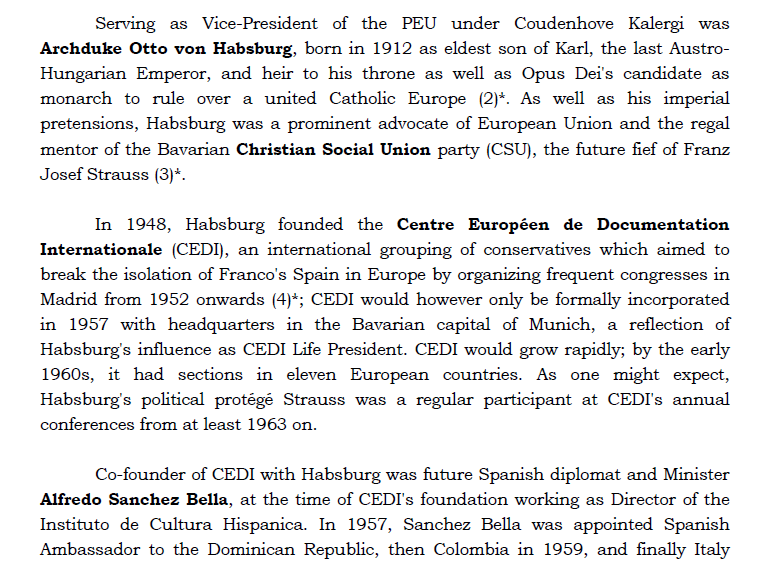 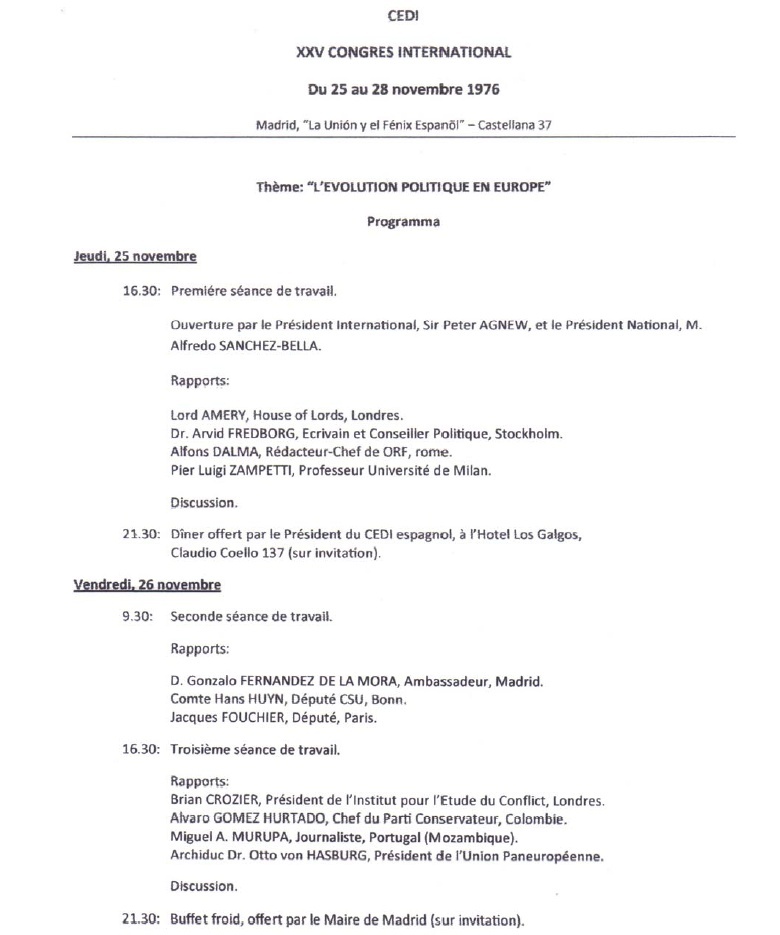 Le lendemain, il y avait un rapport de Paul Vankerkhoven, président du CEPIC ... Le lieu retient l'attention : "La Union y el Fénix Espanol" Cette compagnie occupait, dans les années 1980, un bâtiment à la rue de la Loi (entre le rond-point Schumann et le parc du Cinquentenaire. http://fr.wikipedia.org/wiki/F%C3%A9nix_Directo Fénix Directo trouve ses origines dans la compagnie d'assurance espagnole La Unión y El Fénix. L'histoire de La Unión y El Fénix remonte à l'année 1864. Fénix Directo a été lancée en Espagne en 1991 comme filiale de La Unión y El Fénix, sous le nom de Fénix Auto. En 1995, à la suite de la fusion entre AGF assurance et La Unión y El Fénix son nom est changé: la compagnie Fénix Directo est née. De nos jours, après la fusion en 1999 avec Allianz, le groupe allemand d'assurance et fournisseur de services financiers, Fénix Directo devient membre d'un des plus grands groupes d'assurances du monde. Fénix Directo est spécialisé dans la vente directe et la gestion d'assurances d'automobiles et de moto par téléphone et internet. Son siège social est à Madrid et c'est une compagnie renommée sur le marché espagnol. |
|   | | HERVE
Nombre de messages : 21558
Date d'inscription : 08/12/2009
 |  Sujet: Re: Brian Crozier Sujet: Re: Brian Crozier  Dim 10 Mar 2013 - 19:26 Dim 10 Mar 2013 - 19:26 | |
|
Pour continuer ce qui a été dit plus haut sur le comité des USA de l'ISC (Brian Crozier)...
Outre John Diebold, un lecteur attentif précise ce qui suit ...
- Richard Pipes : un soviétologue universitaire ; je suppose que c'était un anticommuniste modéré.
- Zbigniew Brzezinski (très important): anticommuniste dur, futur conseiller de Jimmy Carter en politique étrangère, c'est un des instigateurs de la politique d'aide aux mujahidines afghans contre le jeune régime pro-soviétique, dès 1978. Dans une interview accordée au Nouvel Observateur, il a reconnu avoir sciemment utilisé cette politique pour provoquer une intervention militaire directe de l'URSS (1979). L'objectif était que les Soviétiques s'enlisent dans un conflit long et coûteux ... en représailles contre ce qui s'était passé au Vietnam.
A la fin des années 1970, Brzezinski a aussi fait en sorte de soutenir la politique chinoise en Asie du Sud-Est (et plus généralement en Asie), contre l'URSS et ses alliés locaux (Vietnam).
Cela passait notamment par un soutien aux Khmers Rouges, pro-chinois ; quand le Vietnam chasse Pol Pot du pouvoir en 1979, les Etats-Unis et la Chine font pression sur les Nations Unies pour que le régime Khmer Rouge conserve son siège à l'ONU, et pour que le nouveau régime (pro-vietnamien) ne soit pas reconnu. Un anticommuniste forcené comme Brzezinski devait détester autant la variante chinoise du communisme que celles existant dans les autres pays socialistes mais il a utilisé à fond la carte chinoise et les Khmers Rouges pour nuire aux Soviétiques et aux Vietnamiens.
- Robert Komer (très important également): un ancien responsable du programme Phénix aux Vietnam. Programme de contre-insurrection contre le FNL ("viet cong"), mis en oeuvre par le gouvernement sud-vietnamien et les américains.
Dans les faits, un système d'extermination des opposants au régime de Saigon (soit élimination directe par l'utilisation d'escadrons de la mort, soit mort en détention suite à une exécution ou des tortures). Le chef de l'antenne saigonnaise de la CIA a reconnu devant le congrès que plusieurs dizaines de milliers de présumés communistes avaient été tués dans le cadre de ce programme (officiellement, 27 000 tués entre 1968 et 1972). Les membres de leurs familles étaient également visés.
Ce sont des choses comme le programme Phénix qui ont incité des agents de la CIA comme Ralph McGehee et John Stockwell à lutter contre leurs anciens employeurs.
La définition même de ce qu'on appelle la "guerre sale" ou la "sale guerre"
Aujourd'hui encore, le gouvernement américain tente de cacher cette affaire, de la minimiser ou de se justifier.
http://en.wikipedia.org/wiki/Phoenix_Program
The Program was designed to identify and "neutralize" (via infiltration, capture, terrorism, torture, and assassination) the infrastructure of the National Liberation Front of South Vietnam (NLF or Viet Cong)
(...)
"One of the first people to criticize Phoenix publicly was Ed Murphy, a native of Staten Island, New York" in 1970.[citation needed] There was eventually a series of U.S. Congressional hearings. In 1971, in the final day of hearing on "U.S. Assistance Programs in Vietnam", a former serviceman named K. Milton Osborn, described the Phoenix Program as a "sterile depersonalized murder program." Consequently, the military command in Vietnam issued a directive that reiterated that it had based the anti-VCI campaign on South Vietnamese law, that the program was in compliance with the laws of land warfare, and that U.S. personnel had the responsibility to report breaches of the law.[citation needed]
Abuses were common.[12][20][21] In many instances, rival Vietnamese would report their enemies as "VC" in order to get U.S. troops to kill them.[22] In many cases, Phung Hoang chiefs were incompetent bureaucrats who used their positions to enrich themselves. Phoenix tried to address this problem by establishing monthly neutralization quotas, but these often led to fabrications or, worse, false arrests. In some cases, district officials accepted bribes from the NLF to release certain suspects.[11]
After Phoenix Program abuses began receiving negative publicity, the program was officially shut down. However, another program of a similar nature, code-named "F-6", was initiated as Phoenix was phased out.[23]
------------------
Une partie des membres des forces de sécurité sud-vietnamiennes, impliqués dans l'opération Phénix, a trouvé asile aux Etats-Unis ou dans les pays occidentaux (France, Australie, Canada), comme réfugiés. Les Américains n'ont jamais été poursuivis.
Une petite remarque personnelle : vu ce qui précède, je suppose que les machines à voter électroniques de John Diebold ne favorisent pas les partis communistes ...
Autre remarque : en savoir plus sur Brian Crozier est important car il est un lien potentiel entre ce qui tourne autour de Violet (présent sur le schéma de Latinus) et des responsables anglo-saxons (y compris Ronald Reagan lui-même). Cela est un complément aux liens entre les mercenaires ("Soldiers of Fortune" est aussi sur le schéma de Latinus) et à la présence d'officiers américains importants très proches de la CIA, de la DIA et des Joint Chiefs of Staff dans l'IESP du général Close, de Yves Dumonceau de Bergendal et de Armand De Decker.
|
|   | | HERVE
Nombre de messages : 21558
Date d'inscription : 08/12/2009
 |  Sujet: Re: Brian Crozier Sujet: Re: Brian Crozier  Dim 10 Mar 2013 - 20:13 Dim 10 Mar 2013 - 20:13 | |
|
Il faut se souvenir que Paul Latinus a confié qu'il avait été recruté par la DIA et que Michel Libert a déclaré de façon très affirmative que Paul Latinus travaillait "pour les Américains". La mère de Paul Latinus a dit en outre que son fils admirait le général Haig.
Il faut insister sur la présence du Général Haig dans l'IESP. Alexander Haig était aussi (comme Douglas MacArthur II) un pilier de la secte Moon (que le WNP a rencontrée, voir le schéma de Libert).
Voir aussi :
http://fr.wikipedia.org/wiki/Zbigniew_Brzezi%C5%84ski
http://en.wikipedia.org/wiki/Robert_Komer
et
http://www.sourcewatch.org/index.php/RAND_Corporation
(...)
"Two-thirds of Rand's research involves national security issues. This is divided into Project Air Force, the Arroyo Center (serving the needs of the Army), and the National Defense Research Institute (providing research and analysis for the Office of the Secretary of Defense, the Joint Chiefs of Staff, and the defense agencies). The other third of Rand's research is devoted to issues involving health, education, civil and criminal justice, labor and population studies, and international economics."[4]
http://www.namebase.org/cgi-bin/nb01/XQ
|
|   | | HERVE
Nombre de messages : 21558
Date d'inscription : 08/12/2009
 |  Sujet: Re: Brian Crozier Sujet: Re: Brian Crozier  Lun 11 Mar 2013 - 19:29 Lun 11 Mar 2013 - 19:29 | |
|
Pour des financements privés, on peut penser à la famille Mellon ...
http://fr.wikipedia.org/wiki/Famille_Mellon#Patronyme
http://fr.wikipedia.org/wiki/Gulf_Oil
Richard Mellon Scaife est le principal sponsor de "the Heritage Foundation"
|
|   | | HERVE
Nombre de messages : 21558
Date d'inscription : 08/12/2009
 |  Sujet: Re: Brian Crozier Sujet: Re: Brian Crozier  Lun 11 Mar 2013 - 19:31 Lun 11 Mar 2013 - 19:31 | |
| Pour information : 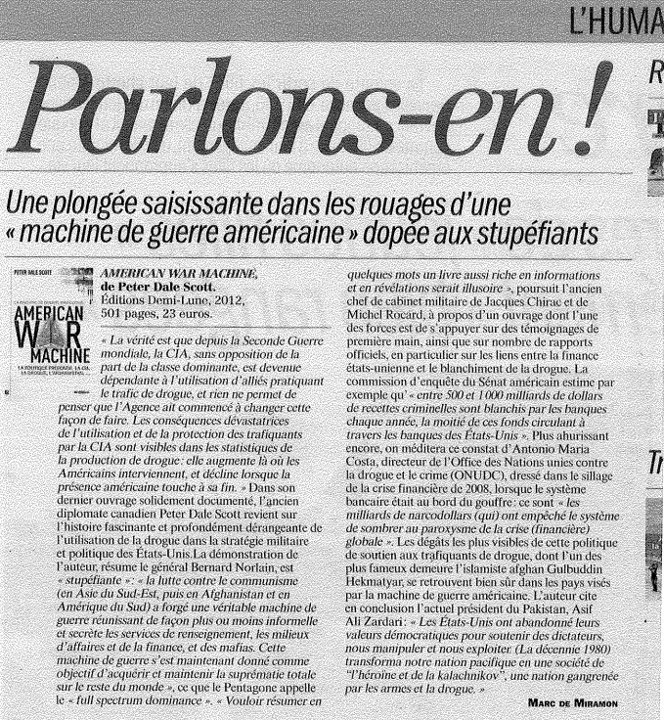 |
|   | | HERVE
Nombre de messages : 21558
Date d'inscription : 08/12/2009
 |  Sujet: Re: Brian Crozier Sujet: Re: Brian Crozier  Mar 12 Mar 2013 - 6:27 Mar 12 Mar 2013 - 6:27 | |
|
Gulf Oil / Q8, cela fait penser à Alain Fauvage
http://fondationprincessedecroy.morkhoven.org/001-Alain_fauvage_temoigne_1___fr.htm
et à son avis sur le rapport PANDA (Placido Palermo ... pizzeria de Messancy)
http://fr.scribd.com/doc/76852932/Panda
Difficile de voir un lien direct là où il pourrait n'y avoir qu'une coïncidence.
Cela vaut cependant la peine de penser à la Stidda et à Caltanissetta (raffineries).
Dans le rapport Panda, on cite aussi un bureau de réviseurs d'entreprises et l'avocat Dumont (qui est intervenu dans beaucoup d'affaires qui nous intéressent et était proche de Sergio Ferrari, qui habite la maison de Paul Cams).
|
|   | | HERVE
Nombre de messages : 21558
Date d'inscription : 08/12/2009
 |  Sujet: Re: Brian Crozier Sujet: Re: Brian Crozier  Mar 12 Mar 2013 - 6:54 Mar 12 Mar 2013 - 6:54 | |
|
En complément au livre de P. Dale-Scott (un auteur à recommander !) ...
En 1996, Mike Ruppert, un policier de Los Angeles, ancien agent de la brigade des stupéfiants, interpelle le directeur de la CIA lors d'une réunion municipale (John M. Deutch). Il accuse l'agence d'être impliquée dans le trafic de drogue (introduction de cocaïne aux Etats-Unis, protection accordée aux dealers etc). Il fait notamment référence à des opérations nommées "Amadeus", "Pegasus" et "Watchtower" (fin des années 1970), pour lesquelles la CIA aurait tenté de le recruter. La réunion en question avait été organisée pour répondre à des accusations similaires publiées dans la presse.
https://www.youtube.com/watch?v=UT5MY3C86bk
https://www.youtube.com/watch?v=l6VYd1gpiNk&feature=related
http://www.c-spanvideo.org/program/CIADr
http://en.wikipedia.org/wiki/Michael_Ruppert
|
|   | | HERVE
Nombre de messages : 21558
Date d'inscription : 08/12/2009
 |  Sujet: Re: Brian Crozier Sujet: Re: Brian Crozier  Mar 12 Mar 2013 - 11:22 Mar 12 Mar 2013 - 11:22 | |
|
Comme dit plus haut, Richard Mellon Scaife est le principal sponsor de "the Heritage Foundation". Cette dernière est liée à la "High Frontier Foundation" :
http://highfrontier.org/heritage-foundation-hosts-roundtable-on-emp-effects/
On y retrouve Daniel O. Graham (CIA et DIA !), proche de R. Reagan :
http://en.wikipedia.org/wiki/Daniel_O._Graham
From 1963-1966, Graham worked for the CIA in the Office of National Estimates. During the Vietnam war from 1967-1968 he was chief of the army's military intelligence estimates.[1]
Graham served again in the Office of National Estimates during 1968-1971, then served as director of collections for the Defense Intelligence Agency in 1971. During 1973-1974 Graham served as deputy director of the CIA under Director William Colby and from 1974-1976 he was the director of the DIA. Ronald Reagan called upon General Graham to be his military advisor for his 1976 and 1980 campaigns. General Graham is a member of the Military Intelligence Hall of Fame.
(...)
https://www.cia.gov/library/center-for-the-study-of-intelligence/csi-publications/books-and-monographs/cia-and-the-vietnam-policymakers-three-episodes-1962-1968/epis3.html
On y retrouve aussi Robert C. Richardson (SHAPE, ...) :
http://en.wikipedia.org/wiki/Robert_C._Richardson_III
(...) In 1981, Gen Richardson teamed up with Lt Gen Daniel O. Graham USA (ret) on a Heritage Foundation project called High Frontier to formulate a long-term national strategy and plan to build a U.S. space-based missile defense. (...)
|
|   | | HERVE
Nombre de messages : 21558
Date d'inscription : 08/12/2009
 |  Sujet: Re: Brian Crozier Sujet: Re: Brian Crozier  Mar 12 Mar 2013 - 11:54 Mar 12 Mar 2013 - 11:54 | |
| En lien avec la "Hoover Institution", et donc très probablement avec Brian Crozier http://www.hoover.org/library-and-archives on trouve Vladimir Bukovsky. C'est un dissident soviétique à la manière de Soljenitsyne, tout aussi médiatique et réactionnaire (pas un simple antistalinien ou "seulement anticommuniste", mais un homme de la droite dure). Lié à des "think tanks" conservateurs américains comme le "Hoover Institution", ainsi qu'à "l'Internationale de la Résistance" (lobby de soutien aux guerrillas anticommunistes à travers le monde, voir ci-dessous). Courtisé par les politiciens de droite (Thatcher, etc), il a participé à la conférence WACL au Luxembourg en 1983 (voir CAIB N°27, p.21). Mentionné dans le dossier de David Teacher sur le Cercle Pinay ("Rogue Agents...", éditions de 2008 et 2011). _ _ _ Une des notes de david Teacher dans laquelle il est question de Bukovsky :   _ _ _ Internationale de la Résistance : ce n'est pas un institut de recherche mais un lobby pro "freedom fighters" (contras, UNITA, Mujahidines afghans, guerrillas anticommunistes d'Indochine etc). Des liens probables avec CAUSA/Moon (voir les travaux de J.F. Boyer) et les réseaux de la WACL. Comparable à la CIRPO de Pierre de Villemarest. The Radical Right: a world directory (C.O.Maolain 1987) Resistance International Leadership: Jean-François Revel Orientation: Anti-communist History: Resistance International was founded in 1985 as a co-ordinating group for supporters of various anti-communist political and guerrilla movements, principally in the Third World. Associated organizations: Revel is also a member of the board of Liberte sans frontieres (LSF), a pressure group created in 1985 by Medecins san frontieres (MSF), which was founded in 1971 to provide medical assistance in areas of the Third World where conflict prevented the functioning of state medical services. Although the MSF is generally regarded as a non-partisan humanitarian organization, the LSF is associated with the French new right; another board member, Jean-Claude Casanova, is linked with the US new right journal Commentary and with the anti-Soviet Committee of Intellectuals for a Europe of Liberties. International affiliations: Resistance International is very similar to the US-basedDemocratic International, founded around the same time. |
|   | | Contenu sponsorisé
 |  Sujet: Re: Brian Crozier Sujet: Re: Brian Crozier  | |
| |
|   | | | | Brian Crozier |  |
|
| | Permission de ce forum: | Vous ne pouvez pas répondre aux sujets dans ce forum
| |
| |
| |
